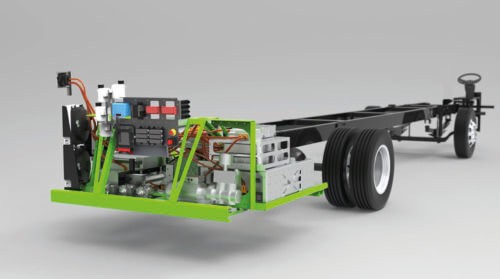Kleanbus has revealed the first images of its modular platform technology which can be used to convert a bus from internal combustion to electric drive in what it says is a quick and cost-effective manner.
Electrification is the most viable way for bus operators to go green, but new electric buses are expensive and can take many months to join a fleet from order placement to delivery, the firm says. It believes that repowering by removing the diesel engine or hybrid powertrain from an existing bus and replacing it with a fully electric powertrain is the fastest and most cost-effective method to transition the whole UK bus fleet to zero emissions, and says that its advanced solution can accelerate that changeover thanks to the company’s unique technology.
Joe Tighe, co-founder and CEO of Kleanbus said: “With 97% of UK buses powered by diesel engines that emit large amounts of carbon, oxides of nitrogen, and particulate matter – and a staggering 35,000 of them on the road – the country faces a major challenge to rapidly decarbonise this vital transport sector and is struggling to move quickly enough.
“Replacing these vehicles with new electric buses is very expensive for private companies and Government subsidies will take many years given fleet turnover rates. Kleanbus offers a fast and efficient way towards zero emissions, making buses cleaner, quieter, more comfortable, and more valuable assets for operators.”
Combining proven and fully warranted electric powertrain components from known suppliers with its own integration technology and proprietary software, Kleanbus says its platform system is technology-agnostic, nimble and adaptable. This approach means that it can take advantage of the very latest componentry, the company said, enabling it to leverage a wide variety of batteries and motors, creating purpose-built e-powertrains tailored exactly to a bus operator’s needs.
The e-motors used by Kleanbus also do not have permanent magnets, the firm added, so use no rare earth materials, demanding less of the planet’s resources and limiting the disastrous impact of rare earth metals production.
From its 9,000sq ft facility in the east of England, the Kleanbus repower programme consists of a full evaluation of the vehicle, removal of its diesel engine and all associated engine and drivetrain components, scanning and prototyping of the vehicle’s interior, design of a bespoke platform, installation of a new e-drive, build, full testing process and final certification. Once a bespoke e-drivetrain has been designed and tested it takes less than two weeks to repower an individual bus, the company explained, getting the vehicle back in service in as little time as possible.
Kleanbus claims that operating costs are also ‘dramatically lower,’ at around a third of those of a conventional diesel bus, and likely to be even greater with the latest new Bus Service Operators Grant (BSOG) Zero Emission Bus (ZEB) incentive of 22 pence per kilometre factored in.
Electric repowered buses from Kleanbus also cost one fifth of a new electric bus, the firm says, and thanks to its partnerships with innovative finance providers, operators can choose several ways in which to finance their vehicle, ranging from paying for the vehicle upfront and leasing the battery, to paying nothing upfront and leasing both the vehicle and the battery. allowing the operator to fund the cost of the repower through operating revenue, maximising the business case.
Through the company’s relationships with charging providers, Kleanbus can also arrange for an operator’s depot to be upgraded with appropriate charging technology, offering what it called a one-stop shop for potential operators.
Joe concluded: “The potential for repowered buses is huge. They could bring about fully electric bus fleets six years earlier than relying on the roll-out of new zero-emission buses alone. This could give a potential saving of over 4m tonnes of CO2 and deliver health benefits of improved air quality sooner – and Kleanbus can play a crucial role in accelerating the transition to a clean future while providing lower operating costs for bus fleets.”


